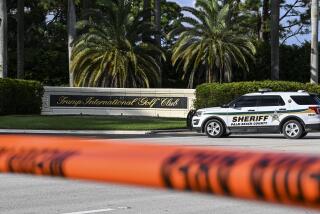Attempt on Karzai rattles Afghans
- Share via
KABUL, AFGHANISTAN — The attempted assassination Sunday of President Hamid Karzai deepened fears that Islamic militants remain able to penetrate the defenses of security forces here despite a boost in international and Afghan troop strength.
Karzai escaped unhurt after gunfire erupted at a public ceremony attended by him and a number of local and foreign dignitaries, including the U.S. ambassador, who also was unharmed. But the brazen attack, mounted from fairly close range, has raised questions about the effectiveness of measures to beef up security in this troubled capital before an expected “spring offensive” by the Taliban insurgency.
Three people were killed in the assault -- a member of parliament, a tribal chief and a young boy. Officials said about 10 others were wounded, including another lawmaker.
It was the second high-profile attack in Kabul this year. In a well-orchestrated January assault, militants shot their way past security guards and blast walls at the city’s only five-star hotel, an establishment frequented by Afghan officials and high-powered foreign visitors. Several people were killed.
A spokesman for the Taliban immediately claimed responsibility for the attempt on Karzai’s life and said that three of six Taliban fighters were killed in the incident. Later in the day, a second Islamic group, headed by notorious militant leader Gulbuddin Hekmatyar, also said it had carried out the attack, according to Afghan television.
Whoever the gunmen were, they were able to open fire and launch rockets from a building only a few hundred yards from where Karzai, the American and British ambassadors, and other VIPs had gathered Sunday morning to observe a commemoration of the victory by Afghan fighters over the Soviet forces occupying their country.
Authorities had tightened security in Kabul for several days before the event, posting plainclothes officers throughout the city and setting up vehicle checkpoints. Soldiers in tanks and armored cars were deployed at the parade grounds, which sit near the presidential palace.
The national anthem had just ended when a sudden fusillade of automatic gunfire sent hundreds of attendees scurrying for cover. Bodyguards quickly hustled Karzai into a car. A live television broadcast of the event showed a lawmaker slumped in his seat and another sprawled on the ground not far from where the Afghan president had been sitting.
The British ambassador to Afghanistan, Sherard Cowper-Coles, told Reuters that he had been standing on the dais next to William Wood, the U.S. ambassador, when the shots rang out.
“It was coming to the end of the 21-gun salute. I saw an explosion and a puff of dust to the left of the parade and then heard the crackle of small-arms fire from all directions,” Cowper-Coles said. “After some hesitation, my bodyguard frog-marched me away.”
A military officer at the scene who declined to give his name said that after the shooting, security forces raided a three-story building, possibly a hotel, near the parade grounds. He said that three suspects had been killed and nine others arrested.
A Taliban spokesman told Reuters that the attack proved that insurgents “not only have the ability to operate in the provinces, but even in Kabul. . . . Karzai and his Cabinet can’t be safe from Taliban attacks.”
For years after the Taliban was ousted in 2001, Kabul had been considered relatively insulated from the violence besetting other parts of the country, especially the south and the east, where the group’s resurgence has been the strongest. But suicide attacks have become frequent occurrences.
At the same time that they are preparing for a possible “spring offensive” by militants, U.S. and international forces stationed in Afghanistan have asserted that the Taliban has been severely weakened. Sunday’s attack, at a high-profile event in the heart of Kabul, was as much a symbolic as tactical strike at that claim.
George Varughese of the Asia Foundation’s Kabul office said it was still too early to say with certainty who was behind the assault. But “whenever there are high-visibility events or high-value targets, to be able to demonstrate any ability to penetrate or to disturb . . . is probably the [attackers’] intent more than anything else -- to show that they can,” Varughese said.
He added that the attack demonstrated that “it’s not enough to militarily counter anti-government activities. You’ve got to have a political answer to all of this.”
Karzai has expressed a willingness to talk to the Taliban as long as the group renounces violence and agrees to honor Afghanistan’s Constitution.
He has survived several previous assassination attempts since becoming president after the fall of the Taliban. Within hours of the latest attack, Karzai went on national television to appeal for calm, blaming the assault on “enemies of Afghanistan” and saying that the Afghan military had already arrested suspects.
Karzai is up for reelection next year. Security is likely to be a major issue in the election.
--
Special correspondent Faiez reported from Kabul and Times staff writer Chu from New Delhi.
More to Read
Sign up for Essential California
The most important California stories and recommendations in your inbox every morning.
You may occasionally receive promotional content from the Los Angeles Times.














